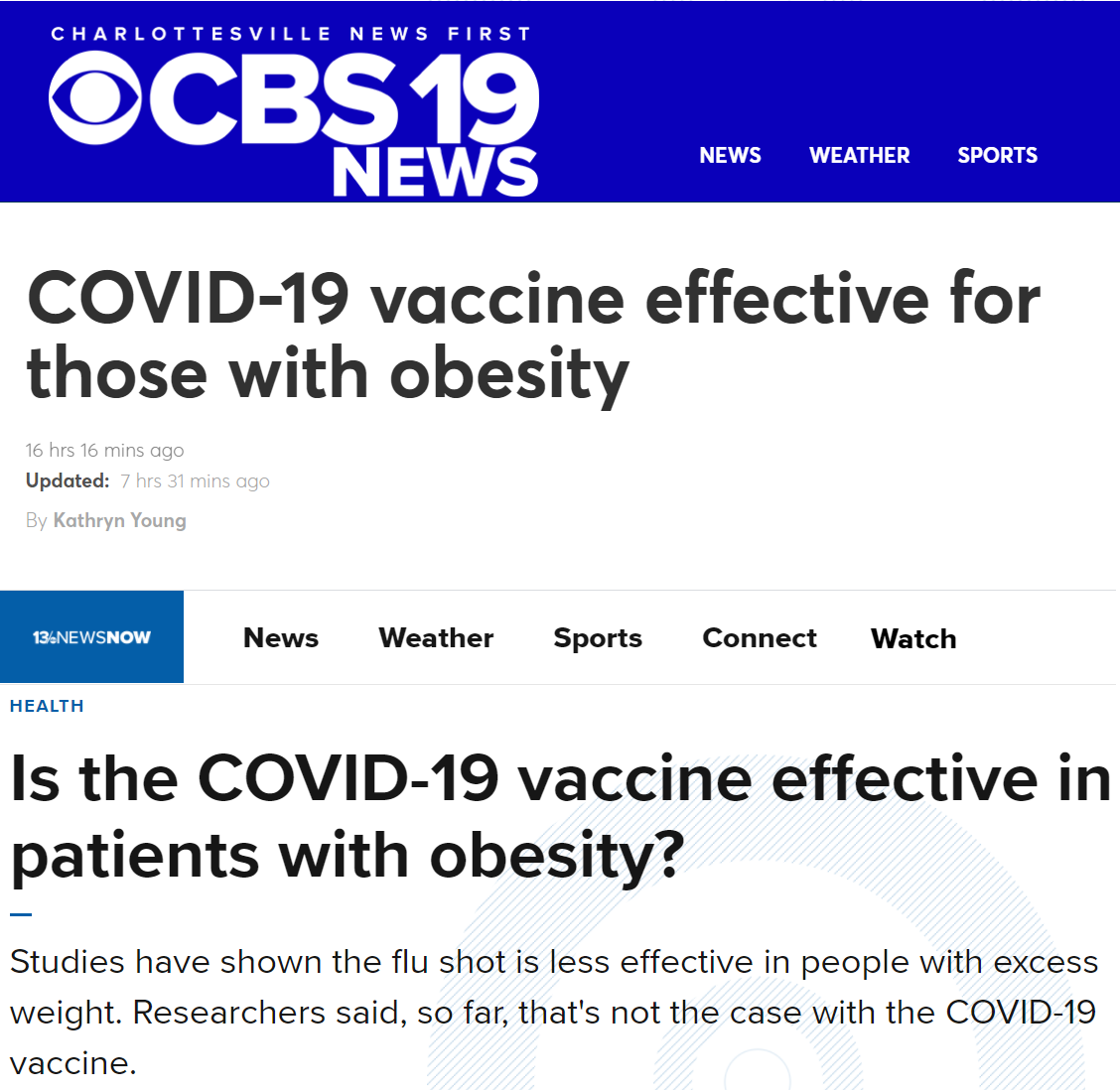
Putting the Mess in Messaging on COVID-19 Vaccines
 Misinformation about COVID-19 spreads so fast that real information has a hard time keeping up. But what we face now is extra hard, because two other difficult subjects are in the mix – obesity and vaccines. So naturally, we’re seeing a mess in messaging about COVID-19 vaccines and obesity.
Misinformation about COVID-19 spreads so fast that real information has a hard time keeping up. But what we face now is extra hard, because two other difficult subjects are in the mix – obesity and vaccines. So naturally, we’re seeing a mess in messaging about COVID-19 vaccines and obesity.
As a matter of fact, the data for COVID-19 vaccines available in the U.S. is impressive. They are just as effective in people with obesity as they are for anybody else. But the messaging is not so clear in the media.
Duelling Headlines
Take these two headlines running last night at two Virginia television stations. One – CBS19 in Charlottesville – delivers the truth clearly. This vaccine is effective for people with obesity. The other – 13 News Now in Norfolk – tells people they should have their doubts.
We have our doubts about the people promoting these doubts.
Solid Efficacy Data for COVID-19 Vaccines in Obesity
Let’s be clear. For the Pfizer and Moderna vaccines we have evidence for remarkable effectiveness in preventing COVID-19. With the Pfizer vaccine, the effectiveness is 95 percent. This was true for 6,000 people with obesity who received the vaccine in placebo-controlled trials, just as it was for 11,406 people in those trials who got the vaccine but did not have obesity.
The Moderna vaccine was 96 percent effective for 5,269 people with obesity who received it in an RCT. That matches the 94 percent effectiveness seen in 10,818 people with no obesity or any other risk factor who received it in the same study.
An Observational Study of the Flu
The people stirring doubts are relying on a 2017 study that found a correlation between obesity and influenza cases for people who had received the flu vaccine. Vaccinated people with higher BMIs got the flu at a higher rates than vaccinated people with lower BMIs.
However, correlation is not causation. This was not a study of vaccine efficacy. It cannot control for influence BMI might have on how vulnerable people with obesity are to the flu. The biological vulnerability might be different. The social exposure might be different, too. As the authors of that study noted at the time, all this means is that “the effectiveness of influenza vaccines, and perhaps other vaccines as well, should be fully assessed in adults with obesity.”
In fact, a 2016 study of flu vaccination in children showed that it works perfectly well for children with obesity.
Finally, we remind the reader that influenza is very different from COVID-19. And flu vaccines are very different from COVID-19 vaccines. So even if we had a study showing that the flu vaccine doesn’t work in people with obesity – which we don’t – that would not serve to disprove the efficacy data we have for COVID-19 vaccines.
Unreasonable Doubts
Thus, we have zero patience with people raising unreasonable doubts about COVID-19 vaccination in people with obesity. For the longer term, we do need to know how long these vaccines will protect people. This is true for people with obesity and for people without it. You can be sure the scientists who brought us these vaccines so quickly are working hard on this question.
But right now, COVID-19 is still killing a lot of people. And these vaccines are the best tools we have for stopping that. Especially for people with obesity who live with a higher risk from COVID.
Click here for further perspective in Obesity and here for more information on COVID-19 vaccines and links to resources for getting vaccinated.
Intime Message, painting by Wassily Kandinsky / WikiArt
Subscribe by email to follow the accumulating evidence and observations that shape our view of health, obesity, and policy.
February 17, 2021

February 17, 2021 at 9:13 am, Allen Browne said:
Hear, Hear!!!!!!!!!!!!!!!
Allen